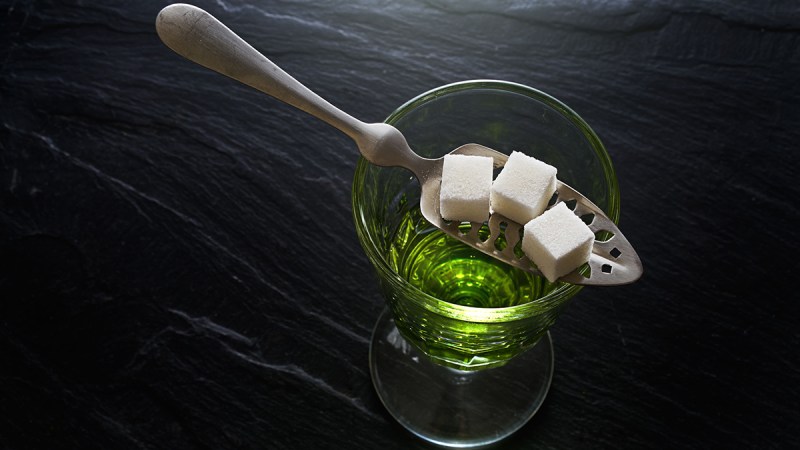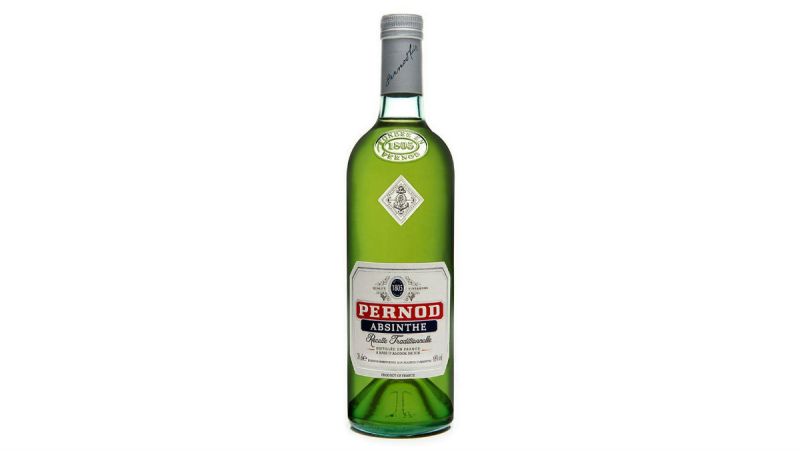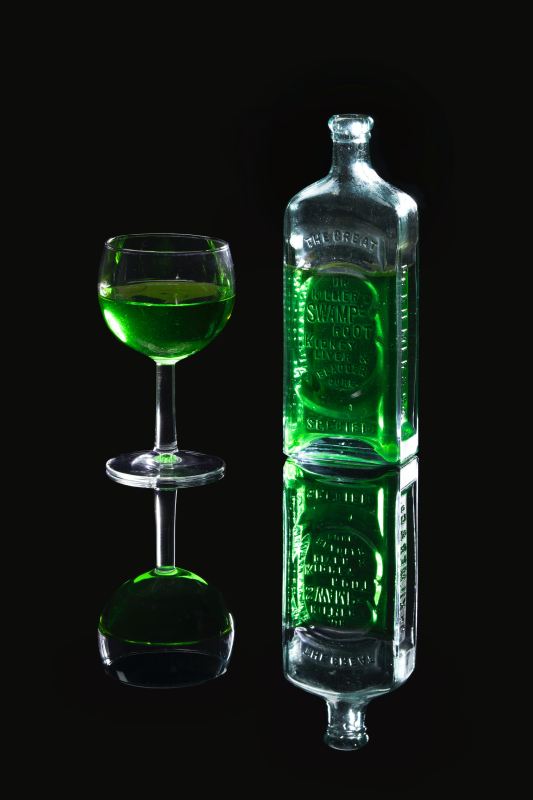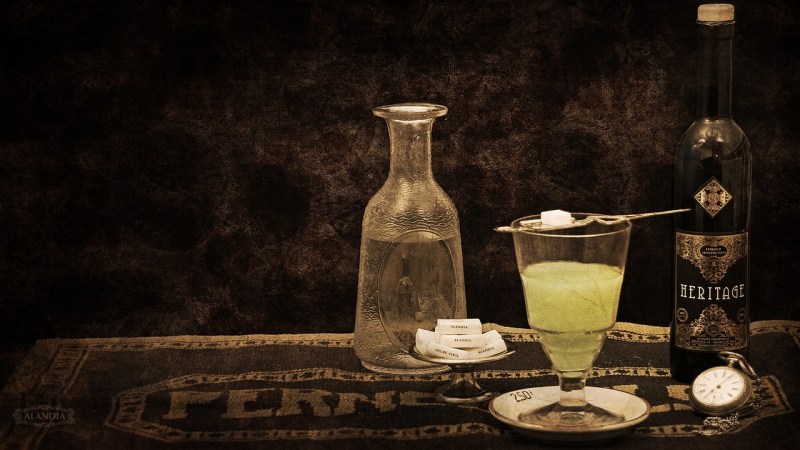
The cocktail revolution has been underway long enough for most people to have tried a Sazerac and realize that absinthe won’t make you hallucinate (if you think you did, try drinking fewer Sazeracs next time). The “green fairy” is more a marketing ploy than a health hazard at this point, but a bottle of absinthe behind the bar still summons images of La Belle Epoque debauchery and pre-Prohibition partying that’ll make you want to grab a flapper and paint the town red. But before you go, make sure you know where to find the good stuff.
Whether you’re mixing Sazeracs at home or hosting your very own Green Hour, here are our favorite authentic bottles of la fée verte.

The best absinthe brands to try
St. George Absinthe Verte
St. George Spirits arrived early to the party when the U.S. lifted the ban on absinthe in 2007, bringing the nation its first legal absinthe. This antique-looking bottle is a great addition to any home bar, because, in addition to being delicious and authentic, it comes in a 200ml bottle, making it great for adding to cocktails a spoonful at a time without committing to lugging it between your next four apartments.

Copper & Kings Absinthe Blanche
Copper & Kings Absinthe Blanche is another American addition to the category, doubling down on the spirit’s craft affiliation with a crystal clear version distilled from Muscat grapes that includes both Absinthe’s traditional botanicals and Copper & Kings’ own accents.

Leopold Brothers Absinthe Verte
This green-eyed beauty cleaves to absinthe’s traditional roots, beginning with a base of Chilean pisco, a grape-based spirit to which they add fennel, anise seed, and grande wormwood. The color is so vibrant it may seem artificial, but it’s achieved by infusing the final product with lemon balm and hyssop.

Pernod Absinthe Superieure
Pernod is the Belle Époque tipple all absinthes are aiming to replicate. Created in Marseille in 1805, by 1901, France was consuming 36 million liters of absinthe every year, which led to a prohibition of their own. But nobody loves tradition more than the French, and they brought back the original recipe in 2013, so you can party like it’s 1899.

Absinthe Jade Nouvelle-Orléans
Jade Liqueurs is a company dedicated to fastidiously reproducing old-world recipes. This bottle uses hand-crafted stills purchased from Pernod, and its pale green product is peppery and warmly spicy.

Vieux Pontarlier Absinthe
Tempus Fugit took five years to craft this award-winning absinthe recipe, using traditional

La Clandestine Absinthe
Just like the French and the Americans, the Swiss lifted their century-long absinthe ban in the early 2000s, and Artemisia-Bugnon distilleries began producing this crystal-clear

Letherbee Charred Oak Absinthe Brun
Letherbee’s absinthe stands out because it draws its color from American oak rather than herbs. Its six-month stint in the barrel mellows the flavors and brings a warm, whiskey-like finish to the spirit.

Golden Moon Redux Absinthe
The distillers at Colorado’s Golden Moon spent years combing old texts, sourcing rare herbs, and tasting vintage absinthe (somebody’s got to do it) to arrive at the recipe and method for their

Doc Herson’s Natural Spirits Green Absinthe
Doc Herson’s Natural Spirits began in a basement in Harlem. They distill all their spirits from scratch, and their absinthe uses 11 different natural botanicals with a hint of mint. For something different, try a bottle of their Red

History of absinthe
Part of absinthe’s mystique is that it was illegal in the States until 2007, largely because of some spurious science that falsely blamed a chemical, thujone, for causing seizures in alcoholics (moral of the story: Don’t let a scientist who blames absinthe for moral decay run your study on
Absinthe is an anise-flavored spirit invented in Switzerland in the early 1800s. It derives its name and flavor from Artemisia absinthium, or grand wormwood (no, wormwood doesn’t make you see things either). The wormwood, fennel, and anise that lend

How to drink absinthe
Absinthe is bottled at a remarkably high proof — it may not send you on a trip, but it will sneak up on you. There are plenty of ways to drink it, but it’s traditionally served by slowly dripping ice water over a sugar cube suspended over the glass on a fancy-looking spoon. Despite what you’ve seen in the movies, it is neither traditional nor advisable to light the sugar cube on fire. The water dissolves the sugar, and the resulting syrup drips into the glass. Properly made

Absinthe cocktail: The classic Sazerac recipe
Way back at the beginning of this article, we mentioned the Sazerac, a classic cocktail that is the first experience that most people have with absinthe. It was invented in New Orleans in the mid-1800s, and it is still the official cocktail of New Orleans today. So, did you think we were going to let you go without giving you the recipe for the classic Sazerac cocktail? Of course, we wouldn’t.
(From A Couple Cooks)
Ingredients
- 3-4 dashes Peychaud’s bitters
- 1 sugar cube
- 1 teaspoon absinthe
- 1 1/2 ounces cognac
- 1 ounce rye whiskey
- Lemon twist
Method
- Add the sugar cube to a mixing glass and coat it with the bitters.
- Muddle the sugar cube with a cocktail muddler or a wooden spoon until it’s mostly dissolved.
- Add the rye whiskey, cognac, and absinthe, and fill the mixing glass with ice.
- Stir until the mixture is cold and strain into a chilled lowball glass.
- Remove about 1 inch of the lemon peel and squeeze into the drink to release the oils.
- Run the peel around the rim of the glass and then put it in the glass and serve.



